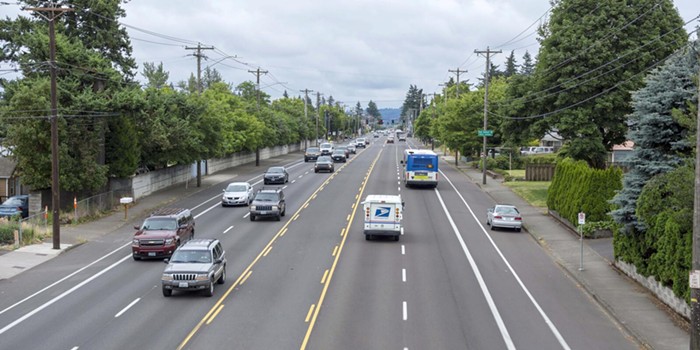
Several Portland advocates for campaign finance reform have filed a complaint against a political action committee (PAC) supporting former Mayor Sam Adams' city council run. The complaint accuses the PAC, called "Sam Works for Portland," of violating local election rules by failing to list the PAC's top donors on a recent flyer mailed to thousands of Portlanders.
The complaint was filed by David Delk and Seth Woolley, two Portlanders involved in campaign finance reform. Woolley is also one of several candidates challenging Adams in the Portland City Council race.
The glossy, three-page flyer sent by Sam Works for Portland landed in many Portland mailboxes Friday afternoon, boasting Adams' endorsements and achievements. It includes a small disclaimer, indicating that the mailing was "paid for and authorized by Sam Works for Portland - an independent coalition of Portland organizations and individuals focused on making Portland a city that works for working families, small businesses, and those facing challenges such as homelessness and lack of economic opportunity."
But that doesn't meet the disclaimer requirements mandated by Portland's new campaign finance rules, according to the complaint. Those rules, enacted in September 2019, require PACs list their top five donors on any communication they share with the public—like a flyer. This information isn't included in the flyer.
"This is a very clear violation of the disclaimer requirements," wrote Dan Meek, a lawyer and campaign finance reformer representing the complainants, in a Friday email to the Mercury.
Sam Works for Portland was formed on April 17 by Jenn Baker, the director of SEIU Oregon State Council. The PAC has yet to report any of its campaign finances on the Oregon Secretary of State's website, where PACs are required to report any spending or donations within seven days after a transaction.
But this doesn't mean the PAC is absolved from sharing their donors. Portland Elections Officer Deborah Scroggin said that while state finance reports "makes it easier" for her office to investigate a campaign for potential violations, there's other ways to track down a PAC's funders. Scroggin said she could not comment on the complaint, but confirmed she received it and said her office has begun its investigation, a process that could take up until May 27 to finalize.
According to Scroggin, any campaign that violates this specific disclosure rule could face a fine of up to $3,000 per violation.
In an email to the Mercury, Baker said the flyer's omission of donor information was "inadvertent," and she was unclear about the legal standing of the city's disclosure rule (a piece of the order had been tied up in a court challenge until recently).
"We now understand that we may have missed the separate disclaimer provisions," wrote Baker. "A review of campaign materials for other candidates reveals that this omission may be common."
Mayor Ted Wheeler was hit with a similar complaint in April for failing to disclose his campaign's top donors on is website and social media pages. Scroggin confirmed the violations and sent Wheeler's campaign a warning. His campaign has since corrected the errors, allowing them to avoid the policy's hefty fines.
Baker also sent the Mercury a list of the PAC's top donors, which include SEIU Local 49 COPE Fund (a PAC), Pacific Northwest Regional Council of Carpenters, Local 48 Electricians PAC, and The Standard Insurance company.



















